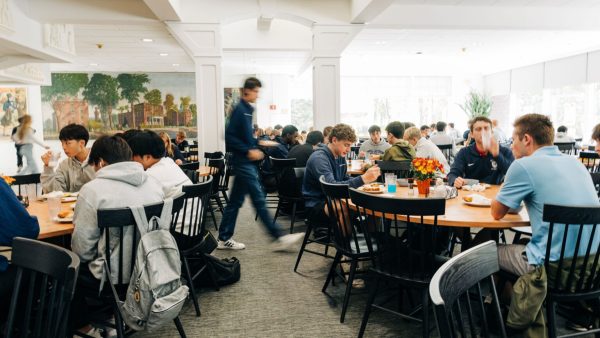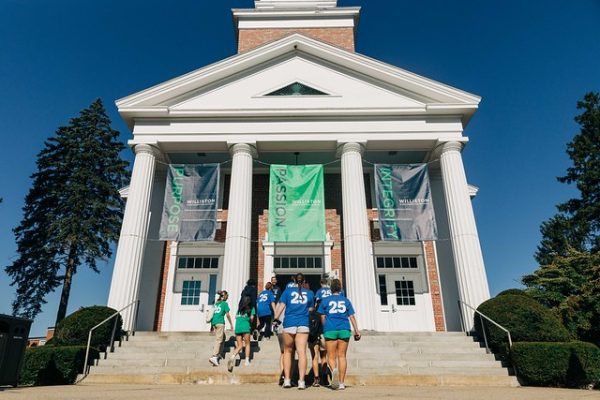New Students Face Exciting Adjustment to Campus Life
Flags outside the Reed Campus Center representing the international students.
Despite loads of activities and commitments, students new to Williston this year are working hard to adjusting to the new environment and lifestyle, all while keeping their mental and physical wellness in check.
In just four weeks, new Williston students have already taken part in several longstanding — and some newer –traditions, including Willympics, the homecoming football game, and a corn hole tournament.
But along with all the exciting new adventures, new students must learn to balance school work, afterschool activities, social life, and sleep; this can be a major transition from their former schools.
Hira Asghar, a first-year junior from Pennsylvania, has navigated her way through weeks of soccer practices, classes, and school events. Now that some time has passed, she feels more confident and on top of everything.
It’s a little difficult to balance,” she explained. “I felt that it was a lot at the beginning but now that I figured out my time better, it is not as bad.”
Hira gets enough sleep, spends time with her friends, and finishes all her work on time. To do so, she had to review her schedule and adjust her classes. She had an AP History class, but after contemplating the overall balance, she transferred into a standard history class. Although school is still stressful, she feels more stable.
“I had a lot of work [from AP History], so I would end up staying up late and then sleeping in my class. Or falling asleep not actually sleeping,” she said. “So now I could focus more on my other classes like AP Chem and AP Calc.”
Hira also takes AP Language, Honors Spanish 5 and Standard US History.
Charlotte Carr, a junior living in EMV, said that she has figured out her schedule now, but she has had to adjust to the workload. Being assigned multiple essays, something she was not used to, has been difficult to manage along with other work.
Hira found the transition difficult at the beginning too. At her previous school in Pennsylvania, homework was not assigned as frequently. Now that classes assign work due the next class, the time given per assignment is shorter than what she was used to.
Sophie Chou, a sophomore and an international student from Taiwan and Japan, also found the increased workload and grading system difficult at the beginning.
“We have homework everyday at Williston and … there are lots of things to manage at the same time,” Sophie said. “And the teacher grades students based on their performance everyday. Whereas in my previous school … their grading system [was] based on tests.”
Teenagers are stressed now more than ever. An American Psychological Association survey reported teens, since 2013, have faced higher levels of stress than adults, according to Developmental Science.
Secondary boarding school, furthermore, can be especially stressful environments, according to a study conducted by researchers from Universiti Kebangsaan Malaysia. Multiple factors contribute to this, including but not limited to the feeling of homesickness, academic pressure, and lack of parental support.
At Williston, there is an international mentor-mentee program lead by Kate Garrity, which supports new international students and helps them adjust and feel comfortable with boarding school life.
Hannah Choi, a senior international mentor from Seoul, South Korea, supports Annika Song, her mentee from South Korea, as a part of an international mentor program. Hannah reached out to Annika during the summer, “so when she [Annika] came, it was easier for me to talk to her because I’ve talked with her during the summer. She asked me a lot of questions since I am a fellow Korean student as well, so I just helped her navigate where different things are in campus and how she should sign up for certain things, like weekend shuttles.”
Hannah also plans to hang out with Annika, possibly at Mt. Tom’s Homemade Ice Cream.
“I think it is a good way to bond with your mentee and talk about your home country and similarities and what you like about school,” Hannah said. “I think it is a good opportunity to make them feel more adjusted and at home,” Hannah said.











